MXF to OGGConvert MXF to OGG, MXF to OGG Converter |
 |
| Home | Getting Started | Download | Buy Now! | Screen Shots | FAQ | Support | Contact |
OGG Video Converter converts MXF files to OGG format easily and quickly. The software is an ALL-IN-ONE audio converter that supports more than 100 audio and video files. OGG Video Converter supports batch conversion, and is full compatible with 32-bit and 64-bit Vista and Windows 7.
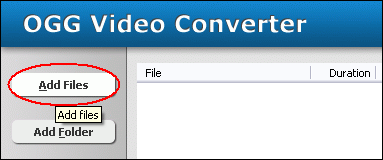 Click "Add Files" to choose MXF files and add to conversion list. 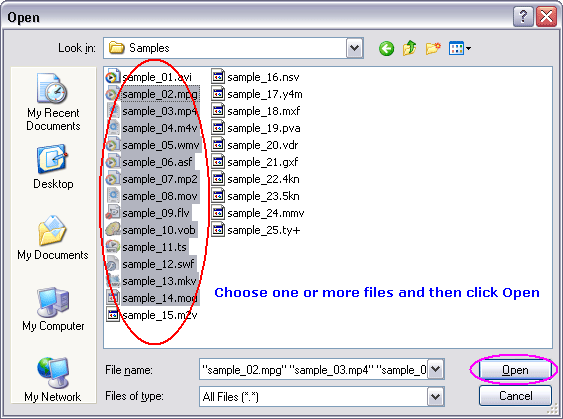 Choose one or more MXF files you want to convert and then click "Open". OGG Video Converter will open the files and get information such as width, height, frame rate, video bit rate, audio sample rate, audio bit rate, audio channels, and then list the information at conversion list. 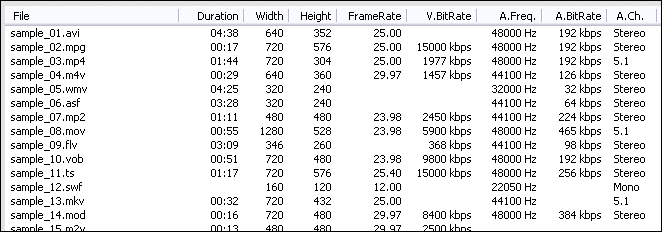
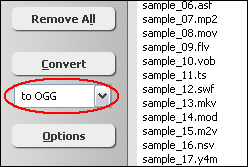
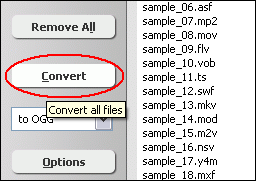 Click "Convert" to convert MXF files to OGG format.  The software is converting MXF files to OGG format. 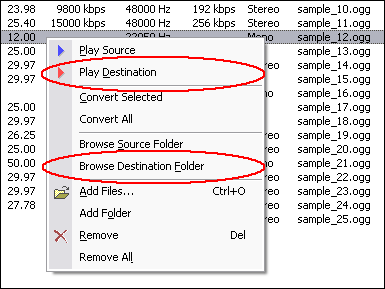 Right-click converted WMA file and choose "Play Destination" to play the outputted WMA file; choose "Browse Destination Folder" to open Windows Explorer to browse the WMA file. What is MXF? MXF has been designed by the leading players in the broadcast industry - with an enormous amount of input from the user community - to ensure that the format really meets their demands. It is being put forward as an Open Standard which means it is a file transfer format that is openly available to all interested parties. It is not compression-scheme-specific and it simplifies the integration of systems using MPEG and DV as well as future, as yet unspecified, compression strategies. This means that the transportation of these different files will be independent of content, and will not dictate the use of specific manufacturers¡¯ equipment. Any required processing can simply be achieved by automatically invoking the appropriate hardware or software codec. However, MXF is designed for operational use and so all the handling processes are seamless to the user. It just works quietly in the background. Besides offering better interoperability - working with video and audio between different equipment and different applications - its other major contribution is the transport of metadata. By developing MXF from the beginning as a new file format, considerable thought has gone into the implementation and use of metadata. Not only is this important for the proper functioning of MXF files, it will also enable powerful new tools for media management as well as improving the content-creation workflows by eliminating repetitive metadata re-entry. The changing technologies in television production, and in transmission to the viewers, means that the traditional methods for moving the content - programme video and audio - within studios is changing too. Not only is there far greater use of computers and IT-related products such as servers, but also the reliance on automation and the re-use of material have expanded. Besides the need to carry metadata, file transfers are needed to fit in with computer operations and they must be capable of being streamed for real-time operations. The development of the Material eXchange Format (MXF) is a remarkable achievement of collaboration between manufacturers and major organizations such as Pro-MPEG, the EBU and the AAF Association. It establishes interoperability of content between various applications used in the television production chain. This leads to operational efficiency and creative freedom through a unified networked environment. MXF is a "container" or "wrapper" format which supports a number of different streams of coded "essence", encoded with any of a variety of codecs, together with a metadata wrapper which describes the material contained within the MXF file. MXF was developed to carry a subset of the Advanced Authoring Format (AAF) data model, under a policy known as the Zero Divergence Directive (ZDD). This enables MXF/AAF workflows between non-linear editing (NLE) systems using AAF and cameras, servers, and other devices using MXF. What is OGG? The name "Ogg" refers to the file format which can multiplex a number of separate independent free and open source codecs for audio, video, text (such as subtitles), and metadata. In the Ogg multimedia framework, Theora provides a lossy video layer, while the music-oriented Vorbis codec most commonly acts as the audio layer. The human speech compression codec Speex, lossless audio compression codec FLAC, and OggPCM may also act as audio layers. The term "Ogg" is commonly used to refer to audio file format Ogg Vorbis, that is, Vorbis-encoded audio in the Ogg container. Previously, the .ogg file extension was used for any content distributed within Ogg, but as of 2007, the Xiph.Org Foundation requests that .ogg be used only for Vorbis due to backward compatibility concerns. The Xiph.Org Foundation decided to create a new set of file extensions and media types to describe different types of content such as .oga for audio only files, .ogv for video with or without sound (including Theora), and .ogx for applications. Because the format is free, and its reference implementation is non-copylefted, Ogg's various codecs have been incorporated into a number of different free and proprietary media players, both commercial and non-commercial, as well as portable media players and GPS receivers from different manufacturers. Convert MXF to OGG Related Topics: MPGA to OGG, MOV to OGG, OGM to OGG, ALAC to OGG, SHN to OGG, PSX to OGG, M2V to OGG, MTV to OGG, AMV to OGG, ROQ to OGG, EAC3 to OGG, DIF to OGG, FLIC to OGG, VOC to OGG, AVI to OGG, XVID to OGG, ALAW to OGG, THD to OGG, F4A to OGG, DVR-MS to OGG, FLV to OGG, QT to OGG, VCD to OGG, VID to OGG, 3GPP to OGG, OGV to OGG, GSM to OGG, 3GP to OGG, MJ2 to OGG, DVD to OGG
|
| Home | Getting Started | Download | Buy Now! | Screen Shots | FAQ | Support | Contact | Links |
| Copyright © 2007-2014 Hoo Technologies All rights reserved. Privacy Policy |